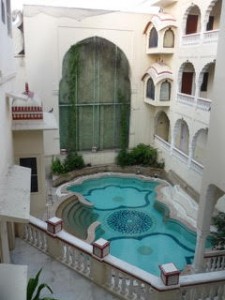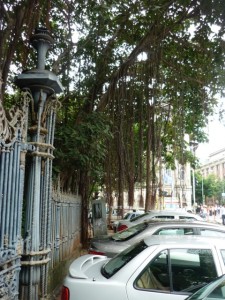By Rashida Murphy
July 1985. Sahar Airport, Mumbai: In the urgent business of holding a baby in my arms while negotiating the curly line towards the exit, to where a Qantas 747 waits to take me to Perth, I forget to look around one last time. I miss the sight of Mumbai or Bombay as it was then, saying goodbye. It was never my hometown anyway. It was just where I lived. And I was on the threshold of a new life, as a desirable immigrant with double degrees and English language skills. Australia, about which I knew little except that it had large reserves of underground water and farms the size of small countries in Europe, waited.
December 1994. Taj Mahal, Agra: Although my ten year old daughter wears a shalwar kameez, the young woman in a khaki sari looks at us suspiciously and asks in Hindi if we are foreigners. My sister and I shake our heads and reply that we are not. She is not convinced and addresses my daughter in Hindi, commanding her to place her bag on the ground and look at her. My daughter looks frightened. In Gujrati I explain what the lady at the gate wants her to do and she complies. Switching back to Hindi I tell her that my daughter only speaks Gujrati and English. The woman loses interest and waves us through.
January 2000. Haifa. Israel: I work two jobs for two years for this trip to the Holy Land. I do not know if my faith in the power of holy places can actually save me. I take my reluctant sixteen year old with me and she spends her entire time listening to unfathomable music through her headphones while I point out the upper cave of Elijah and stand speechless before the Shrine of the Bab. I am unravelling. When I return to Perth, I know I cannot be saved but I kiss the ground at the airport because my teenager doesn’t need to carry a gun and guard a bus-stop in this country. Then I walk out on a twenty year old marriage and spend several days on the kitchen floor, trying to stop crying.
July 2004. Perth: The girls at work grin when I request a day’s leave at the start of a busy teaching term. ‘We’ll cover you,’ they say, waving away my thanks. ‘We’ll send the students home if we have to. Go. Get married. Have a good life. And bring us some cake.’

Travelling in Jaipur, 2010: A man on a camel is asked to pay road tax for using the camel as a vehicle
September 2010. Mumbai: My sister tells my husband not to say my name out loud in taxis or in crowded places. We are travelling to Udaipur, Jaipur and Delhi and she is nervous. It is two days before the Babri Masjid High Court verdict. ‘The verdict could go either way,’ says my sister worriedly. ‘You really shouldn’t be travelling.’ I wave away her fears, reasonably confident that multi-ethnic India was not about to explode in self-righteous religiosity. But it is eerily quiet in Udaipur and taxi drivers are tight-lipped. The palatial hotel is virtually empty and no one makes eye contact. I tell my husband not to say my name out loud when we go out.
And India settles down, takes demolition in her stride, lays open the communal divide and closes it again.
March 2014. New Delhi: Plastered with organic Holi rang, I stand on the balcony of a high rise in Gurgaon. The woman standing beside me has known me for forty years. I used to ride to her house on a rickety bicycle on Sundays because her father made the most awesome omelettes I have ever tasted. Our children are now older than we were then. We look at each other and wonder – have we become the mothers we remember? Are we gentle, nice, friendly, less distracted? And how did we get here?
April 2015. Perth: Another milestone. A completed PhD. Wonderful and horrible moments spent alone; four years of trying to figure out something. Hoping someone else will think it was important. And Australia, about which I know a little more than I did thirty years ago, gives me these gifts – safety, education, health, family – while denying those very things to thousands like me, turning back the boats, closing remote communities and funding climate-change sceptics. It’s a double-edged sword – this immigrant life.
Images source: Rashida Murphy
Rashida Murphy’s stories and poems have been published in international journals and anthologies. She has just been shortlisted for the Dundee International Book Prize for her novel, The Historian’s Daughter. She has lived in Perth for 30 years, having emigrated from Mumbai in 1985.




Rashida is brilliant. Her pieces touch the heart.Wish her success for the future.
Thank you very much Sherebanu, your comment is especially lovely.
These are truly beautiful snapshots of the immigrant experience.
Thank you Marlish, much appreciated.
Most acutely observed, keep doing it. And congratulations on the shortlisting, all the best.
Thank you Sunita, I truly appreciate your comment.
Ah, what clear-eyed, heart-bruised, heart-swell observations of the complexity of a multi-located life. Lovely Rashida, and a challenge or invitation to contemplate the blessings and burdens of life in different places.
Karen, thank you so much for your beautiful response. So well put, the ‘blessings and burdens’ indeed. Thank you.
Only you could have done it! Summing up three decades of location/ dislocation of yourself in such a snapshot manner yet so beautifully and poignantly.
Thank you so much Rumana Husain. Coming from someone who knows about dislocation, I treasure it.
Succinct and Potent !
Thank you Sumathi. I appreciate your comment.